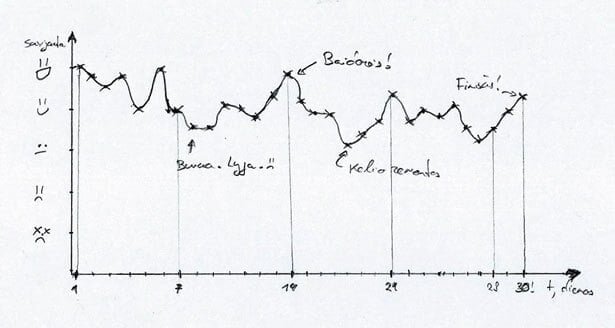Sorry, but I rarely hear this question:
"How long should my challenge last?"
…And I don't understand why. Because, it seems, this is one of the most important questions on which the outcome of all challenges depends. Their effect.
After all, if you don't answer this question, experiments and adventures can become worthless.
3 types of challenges and for which type is this question most important?
Although at this moment I cannot (and do not want to) summarize and define all possible types of challenges and present the differences, I would distinguish three main types:
A) Difficult but non-repetitive challenges:
For example, you were walking in the forest and you were attacked by a group of wild bums and one dog*. You let yourself run and successfully, gathering all your strength, ran home. You saved your life - you passed the challenge.
(* Yes, you read that right. Use your imagination.)
Another scenario: you live in Russia, you wrote a negative comment about Putin on Vkontakte. The next day, your house unexpectedly burned down - no one knows why. Now you are homeless and trying to survive on the street. You survive and emigrate to a normal country - you have also overcome the challenge.
B) Repeated challenges of moderate difficulty:
For example: you have no friends and your mother took all your heroin. You decided to go out on the streets every day and meet at least one new person because you want to learn good communication skills. You've gone out into the streets and you're aiming for a goal every day. After a month, week, half year or other period, the challenge is over.
These are also challenges in which you decide how many times and for how long you will do something. For example, you run 5 kilometers every day or you try not to change every day.
These challenges are repeated many times.
C) Simple, self-monitoring challenges:
This is, for example, monitoring what time you fall asleep every night, how long you sleep and how you feel in the morning. Or tracking how much and what you spend money on. Or how your body mass changes during sports.
These are challenges that you wouldn't really call "crazy". But they take a long time.
For which types of challenges is it important to answer the question of duration?
Answer: B and C. Especially C.
How long should my challenge last?
Here are three answers:
1) If it's life challenges (Type A)…
…Until you reach your goal. Big challenges are important challenges, so we often can't fit them into a time frame. Oh, and we shouldn't. Just keep working until you feel like you're done and you feel grown up.
2) If these are personal challenges (Type B or C)…
…We will need to use some statistics here. However, it is not the reward at the end of the journey that is important in them - but all the discoveries along the way.
Thus, they should continue until enough information points are collected. I didn't know what to call them, so here it is - I made up a new term. What is it? Well, one package of information, one line in your notebook.
Here, for example, are two pictures from my experiment when I tried to get up at 4 in the morning:

…and…

Every day, before going to sleep, I noted when I went to sleep, as well as how I felt in the morning and during the day. One day - one post. And one post is that "information point".
"So how many of these information points should I collect during my challenge?"
Answer: As much as it would help to find the appropriate average, median of the answer and you would have, in your opinion, a sufficient scope of your research.
- One is too few. Because if you made a mistake, your conditional error is 1 out of 1 or 100%.
- Two is too few. Because if you make a mistake once, the error is 1 of 2 or 50%.
- Three times - conditional error 33%.
- And so on…
(By the way, I also just made up the term “conditional error.”)
What you need is to repeat your challenge until the risk of measurement error is reduced to a minimum value. Best - 0.5% and less. The less the better.
However, this does not mean that you need to take and test yourself… 100/0.5 = 200 days…
…Can. If you want to. But it is not necessary. That's a hell of a long time!
Therefore, I recommend another value: 50 reps for your challenge.
This would result in a conditional error of about 2%, and if you only perform the test step once a day, the result is not bad at all. Just 50 days.
Does my challenge have to last 50 days?
No. No. No.
If you keep track of how many times you go on Facebook in an hour, your time measurement would be... An hour. Then you would need just 50 hours for the test. If you watch how many steps you take per minute, then you will only need 50 minutes.
Question - How long does it take you to post a new line of information? How long does it take to register an "information point"? Based on this, you choose the duration of your challenge.
If it takes you 50 years to collect 50 information packets, make it a 50 year challenge. If it takes you 50 minutes, so be it.
What if I want to collect more than 50 information points to ensure a more accurate answer? Then you can continue the challenge longer. It's your choice.
calculating,
Daniel